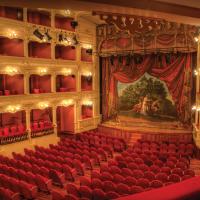Stravinsky’s opera The Rake’s Progress is a moral fable with frills brought bang up to date for 1950s London by his utterly untraditional music. The narrative was inspired by a series of eight engravings of the same name about the sins of old London by William Hogarth in the 1730s. Stravinsky viewed these in Chicago in 1947 and realised they would be the perfect basis for the opera that had been hovering in his mind since he had arrived in the United States. Stravinsky approached the poet
W H Auden who, with his American friend Chester Kallman, agreed to write the libretto and the opera was first performed in Venice in 1951.
Stravinsky was best known for ballets such as The Firebird and The Rite of Spring and religious works such as Symphony of Psalms. But after his ‘Russian Period’ he looked back to Mozart while at the same time producing something new and different in a neo-classical style. The Rake’s Progress was his last work in this genre and its jagged, spiky, sometimes quirky music perfectly fitted his characters. The unexpected dissonances and complicated rhythms beautifully describe the players in the almost back-to-Aesop moralising of the libretto.
In the country, Tom Rakewell (The Rake) and his fiancée Anne Trulove are young and in love, though Anne’s father is dubious about Tom’s idleness and unsuitability as a son-in-law. Out of the blue, Tom hears that he has inherited a fortune from an unknown uncle. The bringer of this good news is the mysterious Nick Shadow, who offers Tom his services without payment for a year and a day.
In London Tom is accompanied by the ever-present Shadow, under whose seductive powers he will remain for the rest of the opera. The manipulating Shadow introduces his new master to the sleazy aspects of London life and is always at Tom’s shoulder as he marries a bearded lady and loses his fortune in a phony invention which uses stones to make bread.
After a year, Tom has had a surfeit of idle pleasure and has lost everything. The Faustian Shadow reveals himself as the Devil and demands Tom’s soul. They agree to stake everything on a game of cards, which Tom wins. But Shadow’s revenge is to steal Tom’s sanity and Tom ends up in the madhouse that was Bedlam, and is mocked by the other inmates. Anne, hoping to rescue her love, visits him there, but in vain: Tom dies of his madness. In an epilogue the characters all agree that the Devil finds work for idle hands.
Composer: Stravinsky Wiki Link: https://en.wikipedia.org/wiki/The_Rake%27s_Progress Title of Musical Work: The Rake’s Progress (Excerpts)